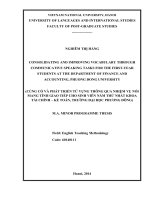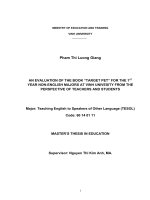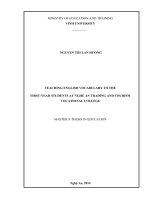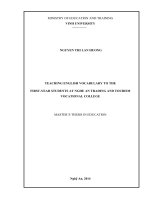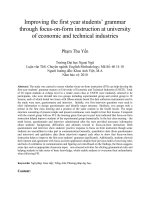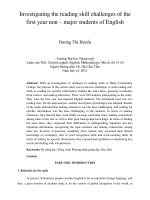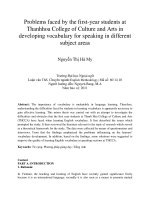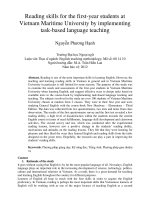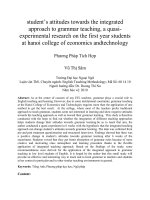3 3 3 the first year
Bạn đang xem bản rút gọn của tài liệu. Xem và tải ngay bản đầy đủ của tài liệu tại đây (2.39 MB, 10 trang )
Suggested levels for Guided Reading, DRA,™
Lexile,® and Reading Recovery™ are provided
in the Pearson Scott Foresman Leveling Guide.
The First Year
by Christian Downey
illustrated by Tom McNeely
Genre
Historical
fiction
Comprehension
Skills and Strategy
• Draw Conclusions
• Plot
• Ask Questions
Scott Foresman Reading Street 3.3.3
ISBN 0-328-13359-0
ì<(sk$m)=bd fji< +^-Ä-U-Ä-U
Reader Response
The First Year
1. If the settlers’ crops grew badly one year,
by you
Christian
Downey
what could
conclude
about that
Tom
McNeely
year’sillustrated
weather? by
What
if the
crops grew
well? Use a graphic organizer like the one
below to help show your conclusions.
Central Issues
Different
Alike
Conclusions
2. Imagine you could talk to Jacob and Sarah
about their experiences. What would you
ask them?
3. Notepad is a compound word. What two
smaller words make it up? Think of other
compound words using note and still
others using pad.
4. Jacob and Sarah moved to a new country.
How would you feel if you moved to a
new place? Why?
Editorial Offices: Glenview, Illinois • Parsippany, New Jersey • New York, New York
Sales Offices: Needham, Massachusetts • Duluth, Georgia • Glenview, Illinois
Coppell, Texas • Ontario, California • Mesa, Arizona
Chapter One
Jacob and Sarah arrived in Virginia with
their parents in the early spring of 1630. They
came on a large ship with many other families.
The new land would be their home. Along with
the others, they hoped to build a colony. It was
a big change for them. Jacob and Sarah liked
the open land. They wanted to explore and see
new things.
Every effort has been made to secure permission and provide appropriate credit for
photographic material. The publisher deeply regrets any omission and pledges to
correct errors called to its attention in subsequent editions.
Unless otherwise acknowledged, all photographs are the property of Scott Foresman,
a division of Pearson Education.
Photo locators denoted as follows: Top (T), Center (C), Bottom (B), Left (L), Right (R),
Background (Bkgd)
Opener: Illustrations by Tom McNeely
Photographs 16 ©DK Images
ISBN: 0-328-13359-0
Copyright © Pearson Education, Inc.
All Rights Reserved. Printed in the United States of America. This publication is
protected by Copyright, and permission should be obtained from the publisher
prior to any prohibited reproduction, storage in a retrieval system, or transmission
in any form by any means, electronic, mechanical, photocopying, recording, or
likewise. For information regarding permission(s), write to: Permissions Department,
Scott Foresman, 1900 East Lake Avenue, Glenview, Illinois 60025.
2 3 4 5 6 7 8 9 10 V0G1 14 13 12 11 10 09 08 07 06 05
3
First they had to build. Jacob and Sarah’s
father helped build barns and cabins.
“Father, can we help too?” asked Jacob.
“Yes, Father. What can we do?” asked Sarah.
“You can help find logs. Look in the forest for
trees and fallen logs. We can make houses and
boats out of them,” said their father.
“Let’s go, Sarah!” said Jacob.
Jacob and Sarah walked to the nearby woods.
4
Jacob and Sarah found many big trees and
fallen logs. Their father and a few other men
used them to build a new boat.
It was still early spring, so the weather was
still cold. To help keep them warm, Jacob and
Sarah’s father made fires from the logs.
Jacob and Sarah’s father also used the wood
to make a gift. He sliced the wood thin, like
paper, and sewed together the pages to make
notepads. Father made one notepad for Jacob
and another for Sarah.
5
Chapter Two
The seeds that Sarah and Jacob had planted
were now budding into flowers.
“It’s growing! We did it!” said Jacob.
“Let’s plant more!” said Sarah.
All through the spring, Sarah and Jacob
helped their mother plant more flowers. Soon,
the garden was blooming with every color!
Spring came. The weather got warm and
the ground thawed. Dew sparkled on the grass
outside in the mornings. Jacob and Sarah’s
mother planted flowers in a garden next to their
small house.
Jacob and Sarah liked to help their mother
in the garden. Sarah helped put the seeds in the
ground. Jacob watered them.
One day, their mother called them outside.
“Sarah! Jacob! Come look!” she said.
6
7
The weather got much warmer as summer
got closer. Fireflies came out at night to flutter
all around the houses. Soon, the settlers were
able to grow vegetables to eat. Native Americans
who lived nearby showed them how. The settlers
planted seeds to grow corn, squash, beans, and
other crops. Jacob and Sarah liked to check on
the vegetables.
8
Chapter Three
The settlers gave the Native Americans tools
for cooking. They traded items. The settlers and
the Native Americans each had things that could
help the other. Jacob and Sarah were thankful.
They liked the vegetables that the Native
Americans helped them plant.
9
It had been raining for several days. Now
that it was summer, the rain was warm. Jacob
and Sarah did not like the many days of rain.
They had to stay inside when the rains came.
Sarah and Jacob looked out the window at
the patch of land where their garden grew.
“Jacob, when will the rain end?” asked Sarah.
“Soon, I hope. But at least the berries will
grow!” said Jacob.
Their mother was growing blueberries and
strawberries. She would make pies when they
were ready.
10
Summer came and went. Soon it was early
fall. The nights started getting colder again.
When the frost came, the settlers tried to protect
the crops and land.
To help predict what kind of weather might
be coming, Jacob and Sarah’s father had made a
weather vane out of wood. He had cut the wood
carefully with the blade of a knife.
Jacob and Sarah’s father had placed the
weather vane on top of the barn. It told them
which way the wind blew. Jacob and Sarah loved
to watch the weather vane twist and turn in the
wind. They wanted to have their own!
11
Chapter Four
In order to make their own weather
vane, Jacob and Sarah first found a piece of rope.
They hung the rope over the branch of a small
tree that grew in their mother’s garden. Then
they tied a pointed piece of wood to the end
of the rope. When the weather was good, they
marked places in the dirt to show which way
their weather vane pointed.
One rainy and windy day, they went out
to the garden. “Sarah, which way is the wood
pointing?” asked Jacob.
12
“It’s pointing to the right,” Sarah said.
“Which way did it point last night before the
rain came?” asked Jacob.
“Last night it pointed to the left,” said Sarah.
“So when it points left, rain might be
coming!” said Jacob.
They ran home to tell their father. He would
be happy that they helped.
13
Chapter Five
All of the settlers came to the feast. Their
Native American friends came too. People
brought bread, meat, cakes, and pies. They made
everything themselves. Everyone shared. Jacob
and Sarah ate the cake they made. When the
feast ended, they went home to bed. Jacob and
Sarah were thankful for their new home.
Jacob and Sarah had been working hard.
They’d been working too hard to notice that fall
was almost over! Winter was now not far off.
One day, Jacob and Sarah’s mother woke them
early.
“Jacob! Sarah! Wake up! Today is the feast!”
she said.
The settlers had been in Virginia for three
full seasons. To celebrate, they decided to have
a big feast. Jacob and Sarah helped their mother
make a cake. When the cake was done, they
cooled it on the windowsill. They walked to the
big barn with their parents.
14
15
Edible Plants
Reader Response
Some birds and insects feed on the nectar
found in plants and flowers. People also rely on
plants for nourishment.
Not all plants and flowers are safe to eat.
Some can be eaten raw, and others must be
cooked. Some plants get sprayed with unsafe
chemicals. Others may have dangerous growths.
Experts know how to identify wild or
dangerous plants. They stay away from plants
that are bitter and those with spines or thorns. It
is safe to eat plants that blossom into food, such
as strawberries, pumpkins, and tomatoes.
1. If the settlers’ crops grew badly one year,
what could you conclude about that
year’s weather? What if the crops grew
well? Use a graphic organizer like the one
below to help show your conclusions.
Central Issues
Different
Alike
Conclusions
2. Imagine you could talk to Jacob and Sarah
about their experiences. What would you
ask them?
3. Notepad is a compound word. What two
smaller words make it up? Think of other
compound words using note and still
others using pad.
Certain plants, like mistletoe, are not safe to eat.
Other plants, like ripe tomatoes on a vine, provide
food for people.
16
4. Jacob and Sarah moved to a new country.
How would you feel if you moved to a
new place? Why?
